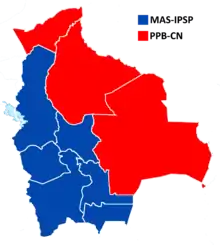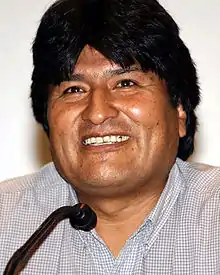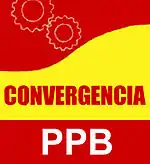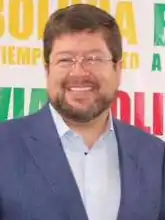2009 Bolivian general election
The Bolivian general election, 2009 was held on December 6, 2009,[1] following a constitutional referendum held on 25 January 2009.[2] Voters elected:
- President and Vice President of the Republic.
- 130 members of the Chamber of Deputies.
- 36 members of the Senate.
| |||||||||||||||||||||||||
| |||||||||||||||||||||||||
.png.webp) Results by province | |||||||||||||||||||||||||
| |||||||||||||||||||||||||
The five departments which had not already done so all voted to have departmental autonomy. Eleven municipalities voted to have indigenous autonomy, out of twelve holding such referendums.[3] One province voted to have regional autonomy.
Presidential election
Under the new constitution, all previous terms will not be considered for term limits. If any candidate fails to win over 50% of the vote and another candidate is within 10%, a second round will be held. It was the first time that an incumbent President will run for reelection.
Candidates
The presidential candidates are:
- Evo Morales (Movement for Socialism): incumbent president, the first of indigenous identity. He is Aymara.
- Manfred Reyes Villa (Plan Progress for Bolivia – National Convergence): former prefect of the Cochabamba Department.
- René Joaquino (Social Alliance): Mayor of Potosí
- Samuel Doria Medina (Frente de Unidad Nacional)
- Alejo Véliz (Pueblos por la Libertad y Soberanía)
- Ana María Flores (Movimiento de Unidad Social Patriótica)
- Rime Choquehuanca (Bolivia Social Demócrata)
- Román Loayza (Gente)


Opinion polling
Polling prior to the election indicated that incumbent Evo Morales enjoyed a 55% approval rating, as well as an 18-point lead over his closest challenger Manfred Reyes Villa.[4] As Morales was expected to cruise to reelection, the local press reported that Villa has already purchased an airplane ticket to the United States for the 7th (the day after the election).[4]
Results

Evo Morales won a convincing victory, with 64.22% of the vote. His party, Movement for Socialism, won a two-thirds majority in both the Chamber of Deputies and the Senate.
| Candidate | Party | Votes | Percentage | Deputies | Senators | |
|---|---|---|---|---|---|---|
| Evo Morales Ayma | Movement for Socialism | 2.943.209 | 64,22 | 88 | 26 | |
| Manfred Reyes Villa | Plan Progress for Bolivia – National Convergence | 1.212.795 | 26,46 | 37 | 10 | |
| Samuel Doria Medina | National Unity Front | 258.971 | 5,65 | 3 | ||
| René Joaquino Carlos | Social Alliance | 106.027 | 2,31 | 2 | ||
| Ana María Flores | Social Patriotic Unity Movement | 23.257 | 0,51 | |||
| Román Loayza | People | 15.627 | 0,34 | |||
| Alejo Véliz | Peoples for Liberty and Sovereignty | 12.995 | 0,28 | |||
| Rime Choquehuanca | Social Democratic Bolivia | 9.905 | 0,22 | |||
| Valid votes | 4.582.786 | 94,31 | ||||
| Blank votes | 156.290 | 3,22 | ||||
| Null votes | 120,364 | 2,48 | ||||
| Total votes | 4.859.440 | 100 | 130 | 36 | ||
| Source: Comisión Nacional Electoral | ||||||
Autonomy referendums
Departments
The five departments which had not already done so all voted to become autonomous departments. Each will have to produce a statute of autonomy. They were:
- Chuquisaca Department—79% voting yes
- Cochabamba Department—76.8% voting yes
- La Paz Department—79.6% voting yes
- Oruro Department—73.1% voting yes
- Potosí Department—73.9% voting yes[5]
Regional autonomy
The Gran Chaco Province in Tarija held a referendum on regional autonomy, which was approved by 80.4% of voters.[6]
Municipalities
The following municipalities voted on whether to become autonomous municipalities according to the Indigenous Originary Campesino Autonomy provisions of the 2009 Constitution. Eleven voted yes:
- Huacaya Municipality (Chuquisaca Department) – 53.7% of voters in favor of autonomy[7]
- Tarabuco Municipality (Chuquisaca Department) – 90.8%
- Mojocoya Municipality (Chuquisaca Department) – 88.3%
- Charazani Municipality (La Paz Department) – 86.6%
- Jesús de Machaca Municipality (La Paz Department) – 56.1%
- Pampa Aullagas Municipality (Oruro Department) – 83.7%
- San Pedro de Totora Municipality (Oruro Department) -- 74.5%
- Chipaya Municipality (Oruro Department) -- 91.9%
- Salinas de Garci Mendoza Municipality (Oruro Department) -- 75.1%
- Chayanta Municipality (Potosí Department) – 60%
- Charagua Municipality (Santa Cruz Department) – 55.7%
One municipality voted no:
- Curahuara de Carangas Municipality[3]
References
- "Bolivien: Einigung über Verfassungsreferendum". Die Presse (in German). APA. 21 October 2008. Archived from the original on 15 February 2009. Retrieved 22 March 2009.
- "Bolivia set for constitution vote". BBC News. 22 October 2008. Retrieved 22 March 2009.
- Diego Andrés Chávez Rodríguez, "La Autonomía Indígena Originario Campesina: Entre la formalidad y la autodeterminación," Diálogos en Democracia, 21 March 2010 (Supplement to Pulso Bolivia).
- "Morales keeps faith with populism ahead of Bolivia poll". FT. 5 Dec 2009. Retrieved 6 December 2009.
- La Bolivia autonómica, Los Tiempos (Cochabamba), edición especial, 6 August 2010
- Ministerio de Autonomías, "Región Autónoma Chaco Tarijeño Archived 2011-04-28 at the Wayback Machine."
- "Las autonomías indígenas avanzan a paso lento per seguro, entre consensos e interrogantes" Diálogos en Democracia, 21 March 2010 (Supplement to Pulso Bolivia).


